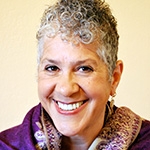
Search Results: sadness
-
-
In this practice group class, certified CNVC trainers Jim and Jori Manske are facilitating the exploration of the topic of Mourning using the three modes of NVC: self-empathy, honesty and empathic presence. You'll learn how to accept a loss, let yourself feel the sadness and all the emotions, and allow yourself to grieve.
-
This chart is intended as an aid to translating words that are often confused with feelings. These words imply that someone is doing something to you and generally connote wrongness or blame. To use this list, when somebody says “I’m feeling rejected,” you might translate this as: “Are you feeling scared because you have a need for inclusion?”
-
Trainer Tip: Mourning enables us to heal the pain and gain clarity about how to meet our needs in the present moment.
-
When faced with someone’s grief for the world, how do you engage with them in a way that is informed? In this session, Kristin suggests exploring what they might be grieving… what they’re afraid of losing… and what it is that they love.
-
Quite a few of us find the darker winter months emotionally tricky. If you're one of those sorts of people, here are three NVC-oriented tips to help you through to spring!
-
- Learn the complexities of intersectionality
- Gain a deeper understanding of the affects of differing life experiences
- Clear the way for a more authentic connection
- Deepen your ability to hold others in compassion
-
Dear friends,
#UnlockYourAuthenticVoice
This has been on my mind lately. What does it mean to unlock my authentic voice? How do I talk about things that matter to me without creating emotional distance between myself and others? I’ve found this especially challenging after the US presidential election this month— half the voters are devastated by Donald Trump’s election, and the other half are elated. The extremes are vast. Sometimes imagining a coming-together feels hopeless.
-
For many, the word “need” is associated with lack, neediness, and scarcity. These associations are the opposite of the meaning of needs in Nonviolent Communication (NVC). In NVC, needs are the motivational energy of our innate wholeness and desire to grow, like the energy of a plant pushing it up through the soil and toward the sun.
-
Working on social justice and racial equity? If you include attending to white culture and privilege as part of that work, you'll reap important benefits. Understanding white culture — along with its embedded historical privileges — provides valuable insight into a larger system of inequity.
-
The season is changing. What have you done to nurture yourself these past several months? It has been summer in my part of the world and moving into fall.
-
Trainer Tip: Notice where you're judging or blaming people for not meeting your needs. Strive instead to notice and name the related feelings and needs longing to be met. Ask a question to check with the other person about what they want and need. This can open up the conversation towards mutually beneficial solutions.
-
Trainer Tip: Our particular needs and expectations in the moment, influences how we feel. So if you are feeling hurt, sad, angry, or disappointed, try to consider what your unmet needs are, and see if there are other ways you can get them met. Today, track how your needs affect your feelings.
-

How do you know when you’re projecting disowned parts or replaying old relationship dynamics? It’s hard to know for sure, but if you find yourself upset or shutting down and unable to have a dialogue in which you can speak clearly about your feelings and needs and empathize with the other’s feelings and needs, there is likely a projection. The stronger your reaction, the more likely you are projecting.
-
When avoidance coping or positive thinking sidesteps challenges, internal and external injustice and unrest also rises as we sidestep our values and integrity. It leaves us in sadness and distress. What's unacknowledged impacts ourselves and others undesirably. To live nonviolently we need to be in touch with what's real. With resonance we can more likely be with what's true, and trust our resilience and inner alignment.
-
Trainer tip: Do you have behavioral patterns that block intimacy? When we are feeling our most vulnerable, we often want intimacy but also tend to keep it at bay. Acknowledge your need for intimacy, and find people you can trust to love you as you are.
-
Ask the Trainer: "What guidance do you have for working with enemy images? Can you say some things about processes and/or exercises that can bring relief from this trap?"
-
Using his own life experience, Eric explores why we need support from others, what support might look like, and what blocks us from asking for support for our relationships.
-
Trainer Tip: We can improve our relationships by focusing our attention first on connection instead of other stragegies.
-
Trainer Tip: Do you ever think you’re taking life just a little too seriously? Many of us work hard trying to improve our outlook, our ability to communicate, and our lives. Sometimes we work so hard, we forget to enjoy life. So let’s make a pact to enjoy our day.



















